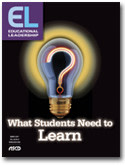"Think for a moment," I asked my teachers at a recent faculty meeting. "What kind of student were you in grade school and high school? Did you always work hard and excel? Or did you challenge your teachers by what you did or didn't do?" I paused for a minute and let everyone reflect. Why was I doing this?
It may be comforting to think we have transcended our past. After all, we no longer worry about what to wear to the prom or what sort of acne cream is the most effective. Playing on the high school sports team or pulling an all-nighter to prepare for that U.S. History final is, well, history. We now have careers, families, and deeper responsibilities. In many cases, we're responsible not only for our own successes and failures, but also for others' performances. But our past never leaves us. The truth is, a lot of who we are is who we were. So how might our individual pasts affect the way we teach, lead, and supervise today?
Who I Was
My school career can be euphemistically characterized as lacking focus. I spent a good deal of time standing in the hall or in the principal's office, dismissed from class for inappropriate behavior. My homework was carelessly done, if done at all. Almost all of my teachers and principals gave up on me, and I quickly got the idea that school wasn't very important and that I shouldn't waste my time or energy on something that didn't seem to benefit me. "Why should I bother?" my actions said.
My experiences as a student who didn't fit the mold stayed with me. When I taught, I gave extra attention to those who struggled. I went out of my way to let students know that I appreciated them, whatever their achievements—or lack thereof—might be. I relished finding students with untapped potential, accepting them for who they were, and helping them grow. I was far from a superb teacher, but I was more sensitive to these kinds of kids because I had been there, done that. (More accurately, I had been there and not done that!)
Who I Became
Likewise, my teaching experience framed how I now supervise others and lead schools. As a teacher, I worked for four principals, and although each was different, they all shared some characteristics. They all wanted student achievement, but adult growth was not a priority. At the infrequent faculty meetings, principals talked and teachers listened. Professional development consisted of attending a conference or workshop once a year, perhaps. Each of these principals was a good person and cared deeply about student achievement; none, however, saw the link between adult and student learning. I felt that disconnect.
When I first became a principal, I worked to open up faculty meetings. I asked teachers to share what they were doing with colleagues. I made professional development a priority. Today, 33 years later, I still work to help everyone in my school grow, children and adults alike, and I'm still sensitive to those students who don't quite fit the mold.
Alas, I am far, far from a perfect principal. Yet I know that some of the most productive things I do stem from my experiences as a student and as a teacher. When thinking about how students learn and how to organize my school, I reach back to my days in grade school and high school. I want my school to be a place where every student can succeed, even one as scholastically desultory and detached as I was.
That's why I began that faculty meeting by asking my teachers to reflect on their days as students. I followed up by asking, "Which kinds of students benefit from your past, and which do not?" We then met in small groups to share our thinking.
Who Are You?
What about you? If you were a teacher's dream, how does that affect your education vision and behavior? Does your history of success make it harder for you to hang in with the students who struggle? Do you get frustrated with students who don't seem to care?
Conversely, if you were a challenging pupil, how do you react to the students who get it right the first time and every time? Is it harder for you to appreciate that honor roll students still need to be pushed and challenged?
And if you're a principal now, what kind of a teacher were you? How does the way your principals led their schools affect how you lead your school today? Do your faculty and committee meetings seem a lot like those in the schools where you worked? Do you interact with teachers in the same ways that your principals worked with you? Is that good or bad?
Our philosophy and behaviors are framed by our histories, and that can be productive or problematic. Why not take a few minutes to reflect on your past and then have your teachers do the same? This is a great question for opening a faculty meeting!


